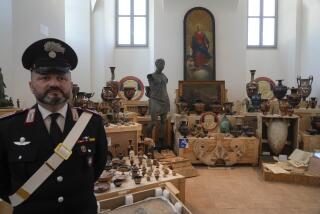‘Bargains’ in Israeli Antiquities Carry a High Cultural Price Tag
- Share via
JERUSALEM — At $50 for a clay lamp or $250 for a carved stone ossuary, buying ancient objects in Israel seems like a bargain. The problem is, that bargain souvenir probably was stolen.
Still, such buys are practically irresistible because they can be such good investments: On Dec. 12, auctioneers at Sotheby’s Inc. sold a chunk of an ancient Assyrian relief showing a winged figure for $5.67 million. It was the highest price ever paid in the U.S. for an antiquity.
Archeologists and even dealers warn that Israel’s antiquities laws are skirted easily, so vessels and coins in stores in all likelihood came from a tomb plundered by antiquities thieves.
“For the investor, it’s a small thing that he’s buying. For us, he’s ruining history,” said Boaz Zissu, the archeologist who heads the Israel Antiquities Authority’s anti-theft unit.
“If an object is discovered in situ, (in its original position), it tells a whole story,” said Zissu. “The same object at a dealer has lost its history and its scientific value.”
Illicit trade in antiquities in Israel runs into the tens of millions of dollars a year, Zissu estimated.
Amir Drori, a former general and now head of the Antiquities Authority, wants to ban antiquities trade, which he says creates demand that feeds theft. The authority oversees antiquities, supervises digs, issues permits to excavators and is responsible for restoring historic sites.
“All the objects that are on the market are stolen, period,” said Denny Pinkus, an antiquities dealer with a store in the 4,000-year-old Mediterranean port city of Jaffa. Pinkus was the first antiquities dealer in Israel to be licensed by the Antiquities Authority (license No. 0001), and is recommended by the Ministry of Tourism.
Pinkus’ two-room store is lined with cases of precious objects, including delicate glass vessels, a 4,000-year-old filter for beer, coins from the Bar-Kochba War in 132-135 A.D., when the Jews unsuccessfully tried to throw off Roman rule, and Phoenician masks. He declines to quote prices.
Pinkus said it doesn’t bother him that the items on sale come from plundered sites. He advises collectors to “go to an authorized dealer, with a good name,” to be sure the artifact they buy is authentic.
Objects on sale at an authorized dealer should have a registration number, and customers should be able to get certificates of authenticity.
Still, an inherent contradiction exists in licensing approximately 50 antiquities shops and then complaining they sell stolen goods, archeologist Zissu said.
Israel and Lebanon are among the few Mediterranean countries that permit legal trade in antiquities.
According to Israeli law, all the artifacts in a licensed shop must have been unearthed before 1978, and have been resold or bequeathed since then. In reality, Zissu said, many of the objects were found recently, turned over to dealers, and registered under false numbers.
More to Read
Sign up for Essential California
The most important California stories and recommendations in your inbox every morning.
You may occasionally receive promotional content from the Los Angeles Times.












